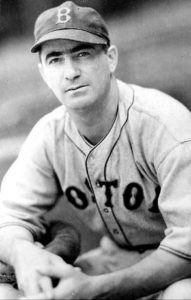Moe Berg: catcher, lawyer, spy

On this day in 1934, Washington Senator’s backup catcher Morris “Moe” Berg’s streak of 117 games in a row without committing an error comes to an end, setting an American League record.
Berg wasn’t your typical athlete: before signing with the Brooklyn Robins (they wouldn’t become the Dodgers until 1932), he graduated from Princeton University with a B.A. magna cum laude in modern languages. Ted Lyons, Berg’s teammate with the White Sox, would say that “he can speak seven languages but can’t hit in any of them.”
Berg didn’t have a great bat, but when every one of manager Ray Shalk’s White Sox that could catch were out with injuries in 1927, Shalk – a player/manager who himself was one of the injured catchers – asked the right fielder to suit up, and it turned out he had a great arm and was a fantastic defensive catcher. He stayed behind the plate for the rest of his career. He worked around his baseball schedule to complete a law degree from Columbia University and passed the New York State bar exam. He would work for a Wall Street law firm during the off season.
In 1934, a group of future Hall of Famers traveled to Japan for a series of exhibition games against a Japanese all-star team. Somehow the inconspicuous Berg made the roster along with Babe Ruth (whom Berg became friends with on the trip), Lou Gehrig, Earl Averill, Charlie Gehringer, Jimmie Foxx, and Lefty Gomez. While the team was in Toyko, Berg tricked the Japanese into thinking he was going to visit the American ambassador and instead made his way to the rooftop of one of the tallest buildings, taking photos and video of the city and port. The footage Berg shot was reportedly used for bombing missions during World War II.
His playing career ended in 1939, and he began a brief coaching career with the Boston Red Sox. When the United States entered World War II, William “Wild Bill” Donovan recruited Berg to join the Office of Strategic Services. He parachuted behind enemy lines on a mission to evaluate which Yugoslavian resistance movement the United States should back. After meeting and evaluating Draza Mihajlovic and Tito (Josip Broz)’s forces, Berg determined that Tito’s Communist partisans were the best bet.
Berg later worked on the project to recruit – or kidnap – Italian rocket and missile specialists. In Switzerland, he was tasked with attending a lecture by top Nazi atomic physicist Werner Heisenberg and determining if Germany was close to developing an atomic weapon. If Heisenberg gave Berg reason to believe that Germany was close to developing a bomb, the agent was ordered to shoot Heisenberg and then kill himself with a cyanide pill. Fortunately for both men, the talk was only about quantum mechanics.
Berg was awarded the Presidential Medal of Freedom — the top award bestowed to a U.S. civilian — for his services.